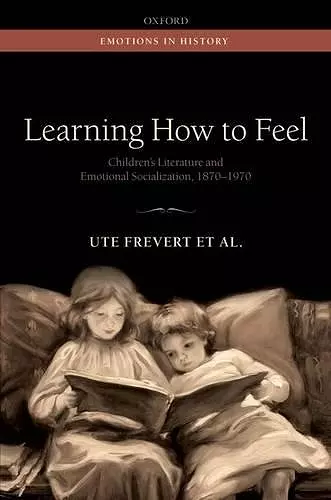Learning How to Feel
Children's Literature and Emotional Socialization, 1870-1970
Ute Frevert author Benno Gammerl author Stephanie Olsen author Margrit Pernau author Pascal Eitler author Uffa Jensen author Daniel Brückenhaus author Magdalena Beljan author
Format:Hardback
Publisher:Oxford University Press
Published:24th Jul '14
Currently unavailable, and unfortunately no date known when it will be back

Learning How to Feel explores the ways in which children and adolescents learn not just how to express emotions that are thought to be pre-existing, but actually how to feel. The volume assumes that the embryonic ability to feel unfolds through a complex dialogue with the social and cultural environment and specifically through reading material. The fundamental formation takes place in childhood and youth. A multi-authored historical monograph, Learning How to Feel uses children's literature and advice manuals to access the training practices and learning processes for a wide range of emotions in the modern age, circa 1870-1970. The study takes an international approach, covering a broad array of social, cultural, and political milieus in Britain, Germany, India, Russia, France, Canada, and the United States. Learning How to Feel places multidirectional learning processes at the centre of the discussion, through the concept of practical knowledge. The book innovatively draws a framework for broad historical change during the course of the period. Emotional interaction between adult and child gave way to a focus on emotional interactions among children, while gender categories became less distinct. Children were increasingly taught to take responsibility for their own emotional development, to find 'authenticity' for themselves. In the context of changing social, political, cultural, and gender agendas, the building of nations, subjects and citizens, and the forging of moral and religious values, Learning How to Feel demonstrates how children were provided with emotional learning tools through their reading matter to navigate their emotional lives.
this [is] an example of rigorous collaborative work ... It is impossible, in the limited space of this review, to do justice to each article individually ... [this book] sets an enticing research agenda for the burgeoning subfield of the history of emotions. * Thomas Dodman, Journal of Social History *
an admirable approach to writing histories collaboratively, resulting in an unusually tightly focused set of sociological questions and six shared conclusions ... The book thus suggests important questions for future research into the roles of authors, publishers and readers in effecting not just emotional change, but also generationally specific social and political transformations, through the emotional experience of childhood. * Siân Pooley, English Historical Review *
ISBN: 9780199684991
Dimensions: 236mm x 162mm x 26mm
Weight: 628g
322 pages